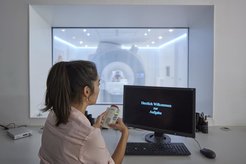"Grateful for the insight into research"
Voluntary Social Year in Research at the Max Planck Institute for Human Development

After completing her higher education entrance exams in Berlin in 2020, Emilia Jaufmann intended to study psychology. Although her grades were very good, they were not high enough for her to enter university immediately. She also wanted to find out what other career options her studies could lead to, apart from traditional ones such as psychotherapy with children and adolescents. For those reasons, she initially decided to spend a gap year volunteering in London.
It was Emilia’s mother who suggested that she look into getting to know a research institution after the year abroad. Together they listened to a podcast episode featuring Simone Kühn, Research Group Leader of the Lise Meitner Group for Environmental Neuroscience, whom they found likeable and competent. After further research, Emilia, aged 20, became interested in joining a volunteer program known in Germany as a voluntary social year in research. She simply contacted Simone Kühn directly – and was successful: Beginning in October 2021, Emilia was the first person to have completed such a program not only at the Max Planck Institute for Human Development but within the entire Max Planck Society.
What was a typical day at work for her? Emilia’s workdays were full and varied: After training to operate the magnetic resonance imaging (MRI) scanner, she regularly tested human subjects for experimental studies. Once she had to summarize ‘fun facts‘ out of study results from the field of environmental psychology ‘ for an ‘escape room‘ with a scientific background and then prepare these in a presentation. She can strongly relate to the concrete questions posed in environmental psychology, such as "do light or tea influence creativity?" Although there are many factors to consider, she likes "isolated results that are interesting and also a bit funny."
Depending on the task, Emilia worked from home or at the Institute in Berlin Wilmersdorf. Although she enjoyed working in the research group, she can't imagine working as a scientist all her life. "You have to be a real workaholic to conduct your own study. It's like having a baby that you have to take care of 24/7," Emilia says, laughing. "A lot of people here live for their job, which I think is great, but I don't know if research is completely my world."
Simone Kühn has also benefited from the program and would like to offer a position again. She thinks it's good to give young people an insight into research processes and thus help them make an informed career decision.
In addition to the practical part, Emilia participated in seminars and received educational support from the organization BIQ.
